

The World Factbook. South Africa. Skip to main content World Malaria 2014 Access Search Advanced search Navigation Language عربي 中文 English Français Русский Español Countries South Africa Map This map is an approximation of actual country borders. Statistics Contact information The WHO Representative Barber, Dr Sarah Louise PO Box 13113 Tramshed 0126 - Pretoria, South Africa Telephone: +27 12 3057709 Facsimile: +27 12 3057729 afwcozawr@who.int Country Office web site Regional Office web site. "South African Courts at Risk" by Mamphela Ramphele and Zohra Dawood. Exit from comment view mode.
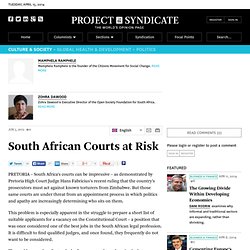
Click to hide this space PRETORIA – South Africa’s courts can be impressive – as demonstrated by Pretoria High Court Judge Hans Fabricius’s recent ruling that the country’s prosecutors must act against known torturers from Zimbabwe. But those same courts are under threat from an appointment process in which politics and apathy are increasingly determining who sits on them. This problem is especially apparent in the struggle to prepare a short list of suitable applicants for a vacancy on the Constitutional Court – a position that was once considered one of the best jobs in the South African legal profession. It is difficult to find qualified judges, and once found, they frequently do not want to be considered. The problem partly reflects a lack of consensus about the criteria that a judicial candidate must satisfy.
News Desk: Black Tuesday in South Africa. South Africa, which many still see as a role model for young democracies—it has one of the most liberal constitutions in the world—just sent a strong message to the rest of the young (and even old) democracies on the continent: get tough with anybody going public with state secrets.
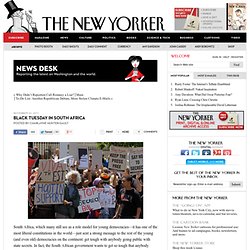
In fact, the South African government wants to get so tough that anybody caught doing so could face up to twenty-five years in jail. That harsh penalty is contained in a bill that the National Assembly approved today by a vote of 229 to 107, with two abstentions. It is officially titled the Protection of State Information Bill, but is widely referred to as the Secrecy Bill. Its opponents include just about every media house in the country; unions whose members were terrorized over their reporting of local government corruption; and most civil-society organizations. Unless, that is, the not-so-secret hope that many hold in South Africa is realized. Protesters in Cape Town. "Information Apartheid" by Zohra Dawood. Exit from comment view mode.
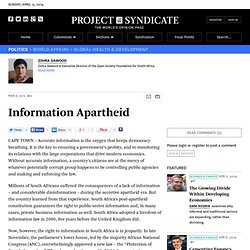
Click to hide this space CAPE TOWN – Accurate information is the oxygen that keeps democracy breathing. It is the key to ensuring a government’s probity, and to monitoring its relations with the large corporations that drive modern economies. Without accurate information, a country’s citizens are at the mercy of whatever potentially corrupt group happens to be controlling public agencies and making and enforcing the law. South Africa: The New Threat to Freedom by Nadine Gordimer. Let the truth be told. By Nadine Gordimer / 16 March, 2012 Writer, activist and Nobel Prize literature prize winner Nadine Gordimer warns that new legislation will return South Africa to apartheid-era limits on free speech Under Apartheid The regime of racism was maintained not alone by brutality — guns, violence, restrictive laws.
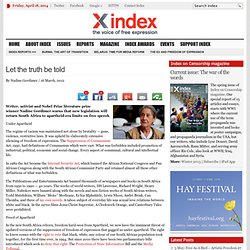
It was upheld by elaborately extensive silencing of freedom of expression. The Suppression of Communism Act, 1950, had definitions of Communism which were vast. In 1982 the Act became the Internal Security Act, which banned the African National Congress and Pan African Congress along with the South African Communist Party and retained almost all these other definitions of what was forbidden.
The Publications and Entertainments Act banned thousands of newspapers and books in South Africa from 1950 to 1990 — 40 years. We must be free to mock Jacob Zuma. The defacing of Cape Town artist Brett Murray’s controversial portrait of South African president Jacob Zuma has fuelled an intense debate in SA about art and offensiveness.
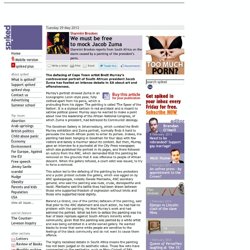
Murray’s portrait showed Zuma in an iconographic Lenin-style pose, fully clothed apart from his penis, which is protruding from his zipper. The painting is called ‘The Spear of the Nation’. It is a stylised cartoon in red and black and is meant to satirise political power. Murray says he wanted to make a point about how the leadership of the African National Congress, of which Zuma is president, had betrayed its Communist ideology. The Goodman Gallery in Johannesburg, which curated the Brett Murray exhibition and Zuma portrait, normally finds it hard to persuade the South African public to enter its portals. Barend La Grand, one of the (white) defacers of the painting, said that prior to the ANC statement and court action, he had had no problem with the painting. Article continues after advertisement. The Real Legacy of Nelson Mandela. A hundred years since birth, but what has happened to the ANC? – By Richard Dowden.
It produced one of the greatest leaders of the 20th century.
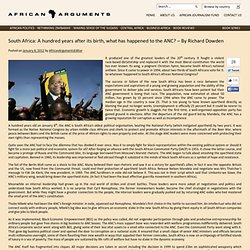
It fought a violent race-based dictatorship and replaced it with the most liberal constitution the world has ever known. Its song, a poignant Christian hymn, became South Africa’s national anthem. Since it came to power in 1994, about two thirds of South Africans vote for it.